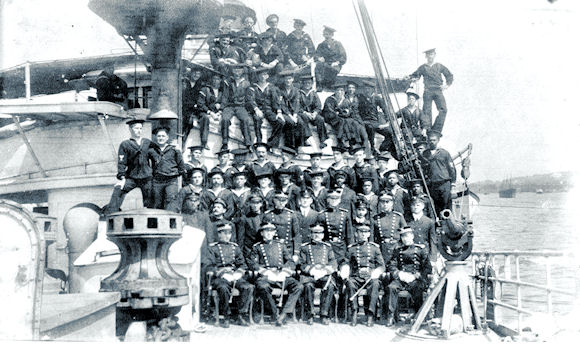HOMELAND DEFENSE
 The outbreak of World War I (WWI) in 1914 saw cutters become responsible for enforcing U.S. neutrality laws. Soon after, in January 1915, these cutters and their
officers and crews merged with the U.S. Life-Saving Service to become the Coast Guard. The Coast Guard was specifically created as an armed service of the U.S. and
was directed to transfer to the Navy in the event of war or upon direction by the president. Plans were immediately put into place to work carefully with the Navy in
determining what roles the Coast Guard might play in any future conflict. Those plans were implemented quickly with the U.S. declaration of war against Germany on
6 April 1917. At that time, a coded dispatch was transmitted from Washington, D.C., via the Navy radio station in Alexandria, VA, to every Coast Guard cutter and
shore station. Officers, enlisted men, vessels, and units were transferred to the operational control of the Department of the Navy. The Coast Guard augmented the Navy
with its 223 commissioned officers, more than 4,500 enlisted men, 47 vessels of all types, and 279 stations scattered along the entire U.S. coastline.
The outbreak of World War I (WWI) in 1914 saw cutters become responsible for enforcing U.S. neutrality laws. Soon after, in January 1915, these cutters and their
officers and crews merged with the U.S. Life-Saving Service to become the Coast Guard. The Coast Guard was specifically created as an armed service of the U.S. and
was directed to transfer to the Navy in the event of war or upon direction by the president. Plans were immediately put into place to work carefully with the Navy in
determining what roles the Coast Guard might play in any future conflict. Those plans were implemented quickly with the U.S. declaration of war against Germany on
6 April 1917. At that time, a coded dispatch was transmitted from Washington, D.C., via the Navy radio station in Alexandria, VA, to every Coast Guard cutter and
shore station. Officers, enlisted men, vessels, and units were transferred to the operational control of the Department of the Navy. The Coast Guard augmented the Navy
with its 223 commissioned officers, more than 4,500 enlisted men, 47 vessels of all types, and 279 stations scattered along the entire U.S. coastline.
 |
| Men of the Port of New York Detachment Drilling |
OVERSEAS COMBAT
 |
| Cutter Yamacraw Was Assigned to Convoy Duty |
 |
| The Crew of the USS Tampa — All Were Lost at Sea, 26 Sept. 1918 (Major Roads Article) |
A large number of Coast Guard officers held important commands during WWI. Twenty-four commanded naval warships in the war zone, five commanded warships attached to the American Patrol detachment in the Caribbean Sea, twenty-three commanded warships attached to naval districts, and five Coast Guard officers commanded large training camps. Six were assigned to aviation duty, two of whom commanded important air stations including one in France. Shortly after the Armistice, four Coast Guard officers were assigned to command large naval transports engaged in bringing the troops home from France. Officers not assigned to command served in practically every phase of naval activity: on transports, cruisers, cutters, patrol vessels, in naval districts, as inspectors, and at training camps. Of the 223 commissioned officers of the Coast Guard, seven met their deaths as a result of enemy action.
LOSSES & AWARDS
Besides those lost aboard USCGC Tampa, eleven were lost from USCGC Seneca on a combat search-and-rescue mission, and another 70 lost their lives due to accident or illness. Two cutters were lost due to collisions, USCGC McCulloch off San Francisco and USCGC Mohawk off Sandy Hook. Heroism was common among Coast Guardsmen as they were awarded two Distinguished Service Medals, eight Gold Life-Saving Medals, 49 Navy Crosses, and 11 foreign awards.
 |
| USCGC McCulloch Sinking Off of San Francisco |
BACK TO PEACETIME
U.S. Coast Guard Chief Historian Scott Price described what happened to the service after the Armistice. "The biggest challenge was to get the Coast Guard back under the Treasury Department—many of the Coast Guard officers liked serving with the Navy, since there were better chances at promotion, etc. so that was one hurdle that had to be surmounted. And before they had a chance to really incorporate the lessons they learned during the war, the nation undertook the great experiment that was Prohibition and so once again we were thrust into a huge new task, one unlike anything we had done to that time, and that consumed the Coast Guard for the next decade or so. But lessons were learned and by the time World War II came around, our escort-of-convoy and port security duties were still paramount—as well as our coastal defense responsibilities."
Sources: United States Coast Guard and the U.S. Department of Homeland Security

A fascinating post--thank you! The US Coast Guard's role in both World Wars tends to be underrated and under-publicized.
ReplyDelete